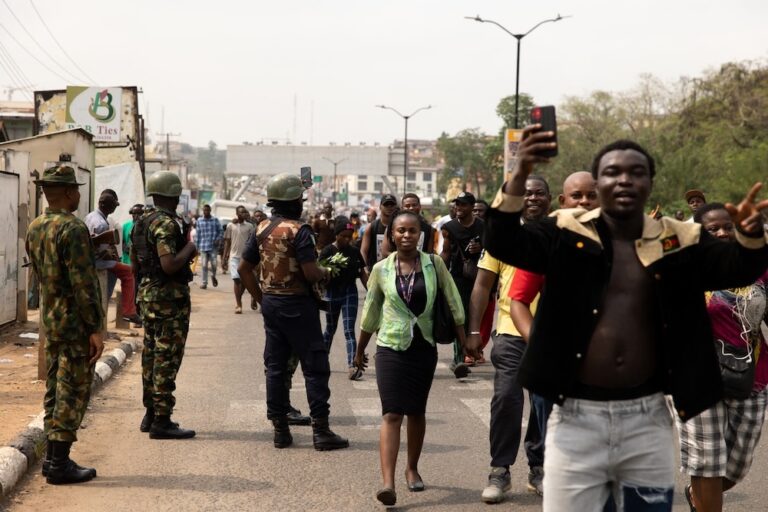(RSF/IFEX) – Since early September 1997, because of articles published about the deterioration of President Sani Abacha’s health, the Nigerian private press has been harassed. More than twenty people have been detained. **For background to cases mentioned in the press release, see IFEX alerts** The coverage given by the private press brought repression from the […]
(RSF/IFEX) – Since early September 1997, because of articles
published about the deterioration of President Sani Abacha’s
health, the Nigerian private press has been harassed. More than
twenty people have been detained.
**For background to cases mentioned in the press release, see
IFEX alerts**
The coverage given by the private press brought repression from
the authorities. On 10 September, Nosa Igiebor, editor-in-chief
of the privately-owned magazine “Tell”, had his home invaded by
security men. This search was related to an article, headlined
“Abacha’s illness worsens”, which mentioned that the head of
state was very ill and suffering from cirrhosis. The same news,
published in the 7 September edition of the privately-owned
magazine “The News”, led to the arrest of an administration
officer, a correspondent, five news agents, five sub-agents and
many vendors of the magazine. All copies of “The News” for sale
in Abuja were impounded.
Elsewhere, a government anti-crime outfit called “Operation
Sweep” is patrolling the streets of Lagos, targeting newspaper
vendors. “Operation Sweep” has already caused the death of one
person and the abduction of another. On 1 July, Godfrey Chukwu, a
newspaper vendor in Lagos, died after the outfit fired without
warning; one of the bullets hit Chukwu in the head. On 11
September, Segun Olatunji, a journalist with the privately-owned
newspaper “The Daily Sketch”, was whisked away by “Operation
Sweep” agents who extorted money from him at gunpoint, before
releasing him.
More and more, Sani Abacha’s government is relying on blackmail
and arrests. The detention by security officers of Reth Ateloye,
the librarian of the magazine “FAME”, is significant. His arrest
is related to a search at the premises of the magazine with the
intention of arresting the editor, who was not in. The officers
left after ransacking the premises of “FAME”. They arrested
Ateloye with a promise to hold on to him until one of the editors
would report to the Police Force CID Headquarters. However, the
librarian was released on 22 September. Another example: after
breaking into the house of Nosa Igiebor, security agents took
away his wife, as he was out of town. She was freed hours later,
but the security men promised to come back for her unless she
produced her husband within 24 hours. Igiebor and his wife
instituted a suit in the Federal High Court, alleging violation
of their fundamental rights.
A few weeks ahead of the meeting at which the reintegration of
Nigeria into the Commonwealth will be discussed, Reporters Sans
Frontieres points out that five journalists are still in prison
in Nigeria. Christina Anyanwu, editor-in-chief of the privately-
owned magazine “The Sunday Magazine”, George Mbah, a journalist
with “Tell”, Ben Charles Obi, editor of the magazine “Weekend
Classique”, and Kunle Ajibade, editor of “The News”, have been in
prison since May 1995 after being sentenced to 15 years in jail.
All of them were convicted of “concealing information and
involvement to varying degrees in the failed coup d’etat”. A
fifth journalist, Mohammed Adamu, editor in chief of the
privately-owned magazine “African Concord”, is allegedly still
detained without any official charge.
RSF calls on General Sani Abacha to improve the situation of the
freedom of the press by securing the immediate and unconditional
release of the five imprisoned journalists, and by putting an end
to the arbitrary arrests which are still being carried out
against members of the privately-owned media.


